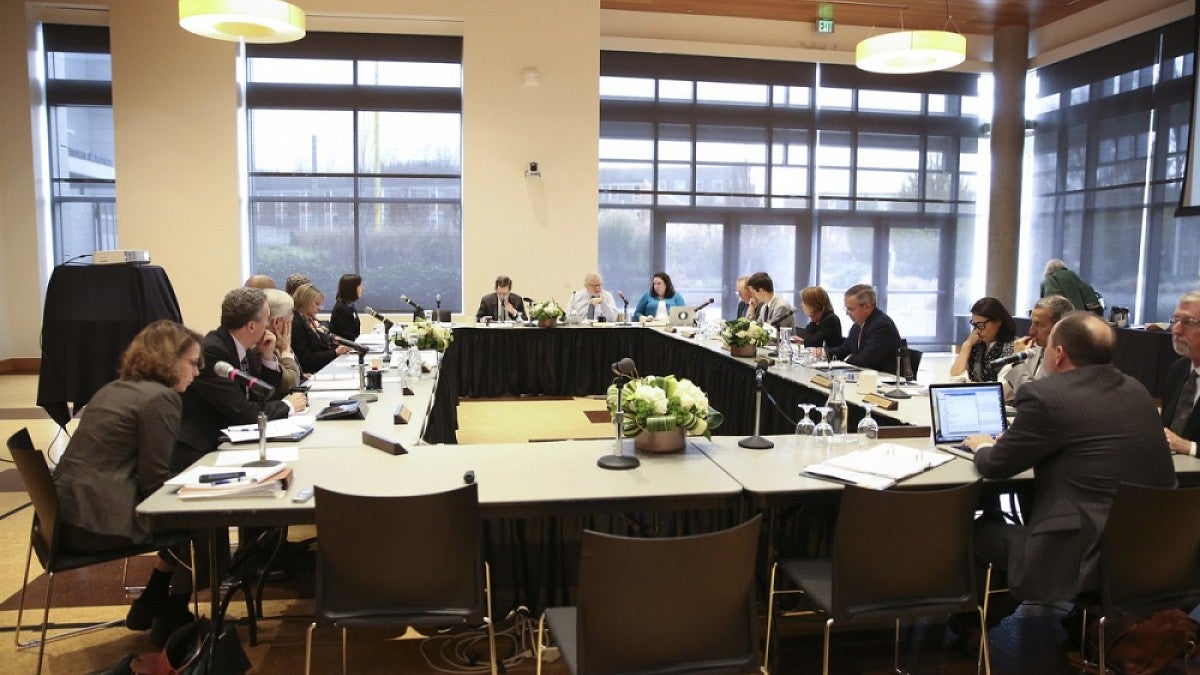The University of Oregon Board of Trustees approved tuition rates for nonresident and graduate students and learned about the university’s effect on Oregon’s economy among other action at its recently concluded winter meeting.
After much discussion, the board voted to increase tuition for nonresident undergraduate students by 2.97 percent for the upcoming academic year. Graduate tuition increases will vary by degree level and school or college, and range from no change up to 5.4 percent across most of the university.
The increases come in the face of a projected and growing budget shortfall for the current and upcoming fiscal years.
“The bottom line, with a drop in enrollment, especially among international students, and an increase in costs such as PERS, salaries, benefits and health insurance, we are facing a substantial gap in resources,” UO President Michael H. Schill told the board. “Even if we receive the additional $120 million we are seeking from the state Legislature for all of Oregon’s public universities, we estimate that we will still experience a shortfall of $10 million to $11 million next year if we were to do nothing. That is unacceptable and it is now evident that we must act to reduce expenditures over the next two years.”
The Tuition and Fee Advisory Board — a campus body made up of students, administrators, faculty members and staff — earlier forwarded its recommended tuition changes to Schill. The increase in tuition equates to about an additional $22 per student credit hour.
The UO will set resident Oregon undergraduate tuition in May, when campus officials hope to have a better sense of enrollment projections as well as the level of state financial support. University officials may not learn about the full amount of state funding until June, when the Legislature concludes its current session.
Without additional state support, the UO will be unable to hold resident undergraduate tuition increases at or below 5 percent and would likely be forced to look at deeper budget cuts.
“This is part of a national phenomenon of governments reducing significantly how much they contribute to education at every level,” UO board Chair Chuck Lillis said. “I think it’s going to present serious financial challenges for a lot of universities.”
The university is looking at other measures to decrease that gap, such as new revenue from campus growth and cost cutting.
The board also learned from Jamie Moffitt, vice president for finance and administration and chief financial officer, that the university’s projected deficit for the current fiscal year increased from $5.5 million to $7.9 million since the board’s meeting last December.
“We can handle a deficit for one year, but not on a recurring basis,” Moffitt said. “We’ll have to incorporate the deficit into our thinking for next year.”
The board also heard a report from UO economist Tim Duy on the university’s economic footprint within Oregon, which he estimated to be $2.2 billion. He also estimated that university activities draw in $781 million from sources outside of Oregon that have an economic impact of $1.2 billion statewide.
English professor Ben Saunders also gave a presentation on comics and cartoon studies at the UO, a popular program with a minor that was the first of its kind in the nation.
“It’s not hyperbole, but only the truth, to say that with continued investment, the UO could be recognized as one of the top five schools in the world in this exciting and rapidly growing discipline,” Saunders said.
The board later approved a capital project to renovate the Zebrafish International Research Center. The university applied for a grant with the National Institutes of Health after being approached by the agency about the opportunity. The grant would fund most of the $8 million project.
“One of the many things that makes us distinct is our preeminence in zebrafish research,” said David Conover, vice president for research and innovation, adding that the university is recognized globally for its zebrafish expertise.
The board also approved a new doctoral program in ethnic studies. The UO will be the first ethnic studies graduate program in the Pacific Northwest.
Laura Pulido, a professor in the ethnic studies department, told the Academic and Student Affairs Committee that the department regularly receives inquiries about graduate study from throughout the West. Within the field of ethnic studies, roughly 70 percent of those graduating with doctorates receive tenure-track job offers soon after graduation.
“I think the time is right,” Pulido said.
In other business, during Monday’s Academic and Student Affairs Committee meeting Bill Cresko, executive director of the Data Science Initiative, gave an update on advances being made in the effort, including faculty member hiring, program development and interinstitutional partnerships.
In addition, Yvette Alex-Assensoh, vice president for equity and inclusion, was joined by Victoria DeRose, associate vice president and director of the Center on Diversity and Community, and Leslie-Anne Pittard, assistant vice president for campus and community engagement, to share an update on new efforts to increase diversity, equity and inclusion at the UO.
Rather than have the effort simply emanate from the Division for Equity and Inclusion, the division will work with campus partners to more broadly embed it throughout campus and make it a more of an everyday part of university operations.
Provost and Senior Vice President Jayanth Banavar briefed the committee on the progress of Willie and Donald Tykeson Hall construction, which is proceeding within budget and remains on pace to open next fall. He also shared that the UO was one of 15 public research universities selected to be part of the launch of a three-year initiative funded by the National Science Foundation aimed at increasing the diversity of science, technology, engineering and math faculty members.
The board’s next set of regular meetings is scheduled to take place May 22-23.


